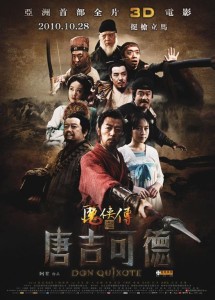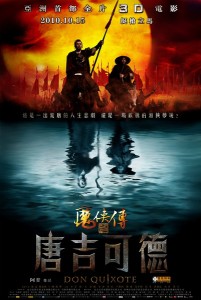Don Quixote
魔侠传之唐吉可德
China/Hong Kong, 2010, colour, 2.35:1, 3-D, 106 mins.
Director: A Gan 阿甘 [Liu Xiaoguang 刘晓光].
Rating: 5/10.
Chinese comic version of Cervantes’ fool-hero lacks pathos and drama below its 3-D surface.
China, Tang dynasty. Tang Fanghai (Guo Tao) is the bane of his parents, an adult dreamer who lives in a world of martial arts novels and their knight-errant heroes. One day he decides to leave home and become a knight-errant himself, calling himself Tang Jihede (Don Quixote), donning armour, christening his horse with a fancy name, and making a local village girl, Sang Cuihua (Lin Jiaxin), into his idealised paramour, Princess Fragrance. After paying an old beggar on a mountain top (Ba Duo) to beat him and “unblock” his magic powers, Tang Fanghai jousts with the villainous Linghu (Liu Hua), whose sect leader, Godfather (Wang Shuangbao), wants to make off with Sang Cuihua. Tang Fanghai is unable to prevent Sang Cuihua’s abduction  but recruits fellow villager Sang Qiu (Wang Gang) as his sidekick with the promise of making him governor of an island. On the way to the capital, Chang’an, he imagines a windmill is a dust-devil that is about to overwhelm an army, and “defeats” it. And at an inn, he fights and defeats another of Godfather’s followers, the epicene Ximen (Haiyitian). By the time he reaches the capital, he has become famous as a heroic knight-errant, and goes to face Linghu, Ximen and fellow tyrant Dongfang (Qin Pei) at their sect’s headquarters, where Sang Cuihua is being held for Godfather’s pleasure.
but recruits fellow villager Sang Qiu (Wang Gang) as his sidekick with the promise of making him governor of an island. On the way to the capital, Chang’an, he imagines a windmill is a dust-devil that is about to overwhelm an army, and “defeats” it. And at an inn, he fights and defeats another of Godfather’s followers, the epicene Ximen (Haiyitian). By the time he reaches the capital, he has become famous as a heroic knight-errant, and goes to face Linghu, Ximen and fellow tyrant Dongfang (Qin Pei) at their sect’s headquarters, where Sang Cuihua is being held for Godfather’s pleasure.
REVIEW
Describing it as “Asia’s first wholly 3-D movie” – only the action sequences in True Legend 苏乞儿 (2010) were in that process – Mainland comic director A Gan 阿甘 (aka Liu Xiaoguang 刘晓光) aims very high with this big-budget Chinese version of Miguel de Cervantes’ 17th-century classic novel but only occasionally hits the target. On paper, the Spanish original seems ripe for adaptation as a wuxia movie, as the mediaeval knights’ code is not a million miles from that of Chinese swordplay fiction, and Don Quixote 魔侠传之唐吉可德 starts off quite faithfully, with popular Mainland comic actor Guo Tao 郭涛 (an A Gan regular) managing to blend the two cultures into an entertaining figure with his likeable combination of chivalrous innocence and complete stupidity. However, after about half-an-hour – around the time the film leaves behind the novel and embarks on its own invented story – it becomes clear that it isn’t developing any dramatic momentum of its own.
It isn’t just a matter of Guo’s character remaining one-dimensional and accruing no pathos. Beyond its good visual effects – which, apart from the dust-devil, largely focus on mistily mythic mountain peaks for 3-D purposes – the film is directed more like a TV drama series than a big-screen adventure, with lots of studio sets (even for exterior shots) and dialogue sequences. The repartee between Guo’s knight-errant and the Sancho Panza-like sidekick of Wang Gang 王刚 is good; but after a while veteran Wang, a popular TV drama actor and presenter (hosting Beijing TV’s popular antiques quiz show World Collection 天下收藏), gradually becomes the most interesting character in the movie, especially in his dialogue with other actors like the oily lackey played by Li Jing 李菁. Good actresses like Hong Kong’s Lin Jiaxin 林嘉欣 [Karena Lam] – stuck in a screamy role as the abducted “princess” – and China’s Miao Pu 苗圃 are wasted.
When A Gan is on form (as with Two Stupid Eggs 大电影2.0 两个傻瓜的荒唐事, 2007), his style of ridiculous comedy can be both funny and inventive. Here, he seems overwhelmed by the scale of the production and its technical demands, as well as (on the scriptwriting side) the challenge of making his Chinese Don Quixote more than just a lightly comic cut-out. On the production side, the movie looks reasonably well-appointed but not lavish, and its rich symphonic score by Zhao Zhao 赵兆 is consistently more expressive than the movie itself.
CREDITS
Presented by Filmko Pictures Beijing (CN), Shenzhen Golden Shores Films (CN), Beijing Wenhua Dongrun Investment (CN), Guangzhou Interstellar Art Broadcasting (CN), Filmko Entertainment (HK). Produced by Filmko Pictures Beijing (CN), Shenzhen Golden Shores Films (CN).
Script: A Gan [Liu Xiaoguang], Yu Baimei, Pan Zhilang. Photography: Chen Chuqiang. Editing: Tang Hua. Music: Zhao Zhao. Production design: Fu Dong, Yu Yufeng. Art direction: Fang Liang. Costume design: Wang Yan, Yu Yufeng. Special make-up effects: Wang Naipeng. Sound: Yin Jie. Action: Xiong Xinxin. Visual effects: A Gan [Liu Xiaoguang], Jiang Jiaying. Choreography: Hua Ming.
Cast: Guo Tao (Tang Fanghai/Don Quixote), Wang Gang (Sang Qiu/Sancho), Lin Jiaxin [Karena Lam] (Sang Cuihua/Xiaoyun/Princess Fragrance), Miao Pu (Jin Xiang Tong), Liu Hua (Linghu), Qin Pei [Paul Chun] (Dongfang), Haiyitian (Ximen), Ying Zhuang (Sima Wan, Daoist), Hong Jiantao (inn owner), Xiong Xinxin (eunuch in black), Wang Shuangbao (Godfather), Li Jing (Hen San), Niu Ben (Don Quixote’s father), Fang Qingzhuo (Don Quixote’s mother), Ba Duo (old beggar), Na Wei (official advisor), Li Jingtong (Sang Cuihua’s father), Feng Li (farmer on island), Deng Jiajia (woman on donkey), Dong Lifan (Sangqiu’s wife), Mo Xiaoqi (woman on island), Zhang Jinming (Xiaohong, famous prostitute), Sun Xing, Xiao Jian, Li Xiaochuan, Zhang Kejia, Jiao Yang, Li Yu (knight-errants), Rong Xiang (butcher), Wu Yajin (cook), Yan Guanying (tailor), Tao Rui (girl buying bird), Xiao Shen Long (male performer), Jin Wawa (female performer), Liu Yongling, Gao Ya (peasants’ wives), Liu Jin (acountant), Xing Xiao (villager), Chen Zhi (servant in black), Chi Lifei (Sangqiu’s daughter), Zhou Hao (Sangqiu’s son), Deng Mingjiang (Dongfang’s servant).
Release: China, 15 Oct 2010; Hong Kong, 28 Oct 2010.
(Review originally published on Film Business Asia, 25 Jan 2011.)
